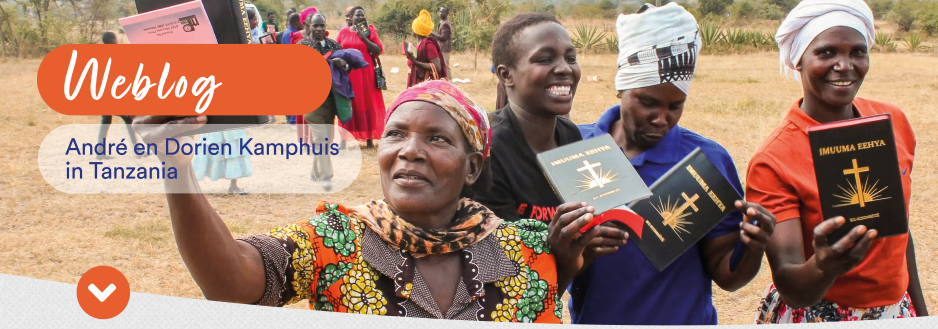 Ik lees net een inspirerend artikel van de Anglicaanse bisschop van Oeganda, Henry Luke Orombi. Hij vertelt onder meer hoe de Anglicaanse kerk in Oeganda veranderd is toen de Bijbel in de moedertaal beschikbaar kwam, en door de christenen gebruikt ging worden. Ik was erg benieuwd naar wat hij te zeggen heeft, omdat ik zelf vaak een Anglicaanse kerk bezoek in Tanzania – een buurland van Oeganda.
Ik lees net een inspirerend artikel van de Anglicaanse bisschop van Oeganda, Henry Luke Orombi. Hij vertelt onder meer hoe de Anglicaanse kerk in Oeganda veranderd is toen de Bijbel in de moedertaal beschikbaar kwam, en door de christenen gebruikt ging worden. Ik was erg benieuwd naar wat hij te zeggen heeft, omdat ik zelf vaak een Anglicaanse kerk bezoek in Tanzania – een buurland van Oeganda.
Hij vertelt hoe de Bijbel het leven van families en bevolkingsgroepen ingrijpend heeft veranderd:
What is important to us is the power of the Word of God precisely as the Word of God—written to bring transformation in our lives, our families, our communities, and our culture. For us, the Bible is “living and active, sharper than a double-edged sword, it penetrates to dividing soul and spirits, joints and marrow, it judges the thoughts and attitudes of the heart” (Heb. 4:12). The transforming effect of the Bible on Ugandans has generated so much conviction and confidence that believers were martyred in the defense of the message of salvation through Jesus Christ that it brought.
De eerste christenen werden ‘ lezers’ genoemd, omdat zij het eerste boek in hun taal konden lezen, de Bijbel:
For the Ugandan church to compromise God’s call of obedience to the Scriptures would be the undoing of more than 125 years of Christianity through which African life and society have been transformed. Traditional African society was solely an oral culture, which limited its ability to share ideas beyond the family level. We couldn’t write our language, and there was nothing to read in our language. The first converts in Uganda were called “readers” because they could read the Bible, the first book available in our own languages. Because of the Bible, our languages have been enriched and recorded. For the first time, we heard God in our own languages. To this day, our people bring their Bibles to church and follow along with the readings.
Dit laatste – dat mensen hun Bijbel mee naar de kerk nemen – heb ik in Tanzania nog niet zo veel gezien, zeker niet in de dorpen. Daar zijn allerlei redenen voor. De belangrijkste zijn dat veel Tanzanianen liever luisteren dan lezen, en dat de Bijbel vaak niet in de moedertaal beschikbaar is. Maar daar wordt aan gewerkt! 😉
Hieronder vertelt bisschop Orombi hoe tijdens de opwekking in de jaren 30, God de Bijbel gebruikte om mensen te overtuigen van allerlei zonden. Vooral voor vrouwen – die bijv. weer kip mochten eten en de enige vrouw van een man mochten zijn – maakte dit een wereld van verschil:
In some traditional African societies, women were denied benefits because of various superstitions. For example, some societies believed that if women ate chicken they would grow beards. In that culture, women, then, never ate chicken. When the Bible came alive during the East African Revival of the 1930s, the Holy Spirit convicted men of such sins of oppression and began the progressive empowerment of women that is continuing today. So, for another example, the African tradition of polygamy and divorce at will left many women neglected and often destitute. The biblical teaching of marriage between one man and one woman in a loving, lifelong relationship liberated not only women but also the institution of marriage and family.
Tot slot nog één citaat, waarin bisschop Orombi laat zien hoe het Evangelie de haat tussen verschillende stammen kan doorbreken:
For many of our tribes, revenge was esteemed as a virtue. If a family had been violated, the first instinct was to gather the clan, arm them, and seek revenge on the family and clan of the offender. In such realms, the Bible has had a profoundly transforming effect, given the teaching of Jesus on forgiveness. Traditional Ugandan society was driven by family loyalties, with little basis for loving those beyond your blood ties. The Bible brought the teaching of Jesus to love our neighbors and even our enemies. And, while there remain remnants of the old culture, the Bible has given us a moral and spiritual basis for transforming culture.
Mijn inspiratie om bijbelvertaalwerk in Afrika te doen, haal ik niet uit de direct zichtbare resultaten. Bijbelvertaalwerk is feitelijk niet meer dan een mogelijkheid creëren voor verandering. God kan mensen nu – voor het eerst – in hun moedertaal aanspreken, en over het alledaagse leven onderwijs geven. Dat kon tot nu toe nauwelijks, vanwege de taalbarriëre. Het Evangelie heeft dan ook vaak weinig zeggingskracht gehad en kerken worstelen met precies dezelfde problemen en zonden als buiten de kerk. De Bijbel heeft de kracht in zich om levens en culturen te veranderen, ook de Kabwa-cultuur en de Zinza-cultuur. Ik hoop dat de Geest in de komende jaren zijn werk zal gaan doen, met kracht!
